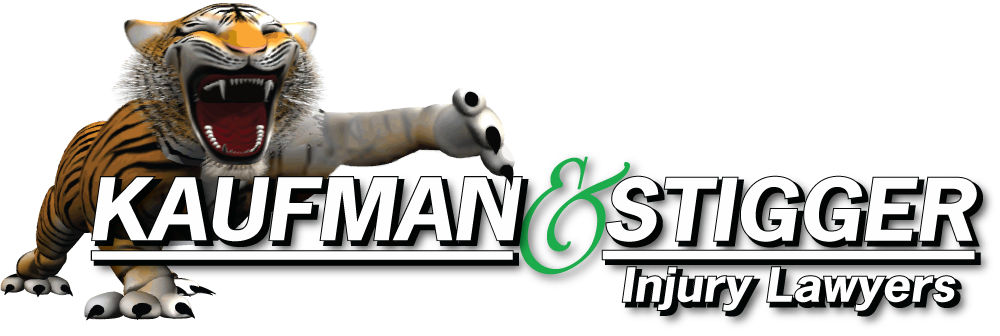At Kaufman & Stigger, PLLC, we help people in Lexington through the legal process after serious accidents—especially ones involving commercial trucks. Whether it’s a rear-end on Tates Creek, a sideswipe on New Circle Road, or a jackknife on I-75, not every truck accident is the same. What is the same is severe injuries and a more complicated recovery. If you’re feeling overwhelmed, we’re here to help. Set up a free consultation today.

Why Would I Need a Lawyer After a Truck Accident?
A truck accident is much different than a normal car accident. It’s not hard to see why: trucks are bigger, the damage is greater, and the list of people who might be at fault is longer. Sorting all that out isn’t simple, but that’s exactly what our legal team can do for you. Here’s how we approach truck accident claims:
- First, we listen to your story. Then we explain your options and what the path ahead involves.
- Once you decide to go ahead with a claim, we start gathering evidence and all the other information you’ll need.
- We’ll look into the details of the accident to figure out what happened and who’s responsible.
- We also handle all the communication with the insurance company and/or trucking company.
- If necessary, we’ll even take your case to court with a lawsuit.
Every truck accident is different, and so is every client. That’s why we don’t use one-size-fits-all strategies. We take the time to understand your story and tailor everything to what you need—not just legally, but personally.
Where Do Most Truck Accidents Happen in Lexington?
If you spend much time driving around Lexington, you’ve probably noticed how many big trucks are out there—especially on the highways. Between through-traffic on I-75 and I-64, and all the local deliveries happening off New Circle Road or Nicholasville, there’s a steady mix of semis, box trucks, and vans moving through town every day.
And with that much traffic comes risk. Some areas are more prone to accidents than others—here are a few spots where we’ve seen serious accidents involving trucks:
I-75 and I-64 Junction – This is a common choke point for both local and long-haul traffic. Fast merges and heavy loads don’t mix well, and when a truck brakes too late or cuts across a lane, it’s smaller cars that usually pay the price. Pictured below is an example of the truck traffic you’ll find at this junction.
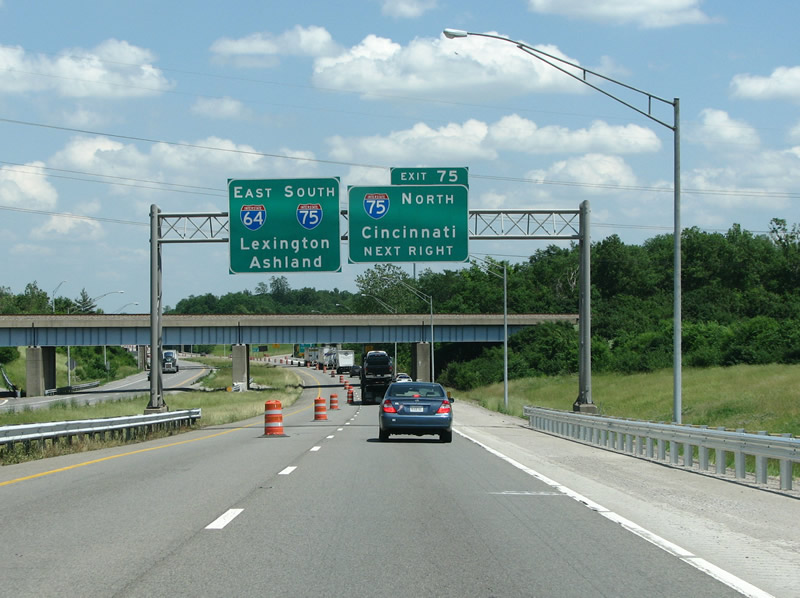
New Circle Road (KY 4) – As the name suggests, New Circle Road loops around the city, but it’s no easy drive. Trucks use it to get between delivery points, but with frequent stoplights, sharp curves, and narrow lanes in places, one mistake can trigger a pileup—especially during peak traffic hours. Shown below is a truck driving along New Circle Road.
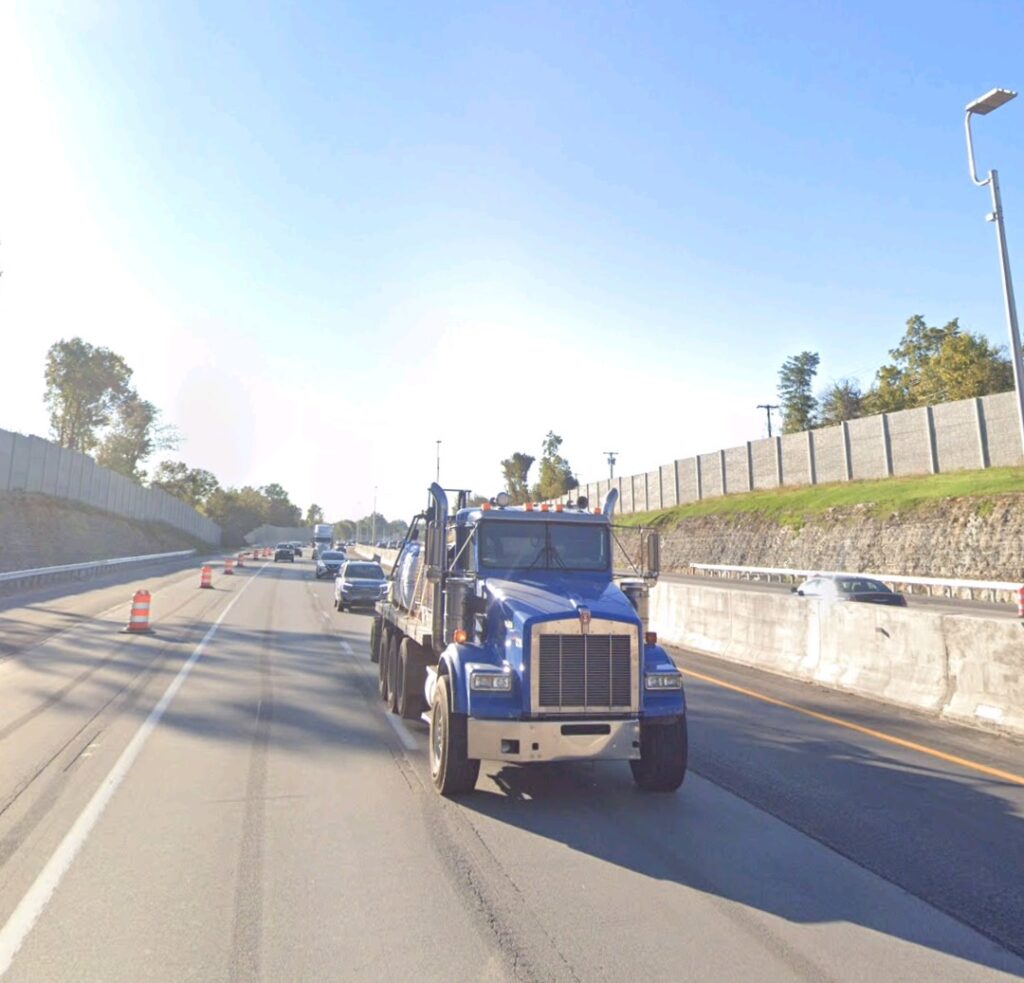
Newtown Springs Road (US 25) – There’s always a mix of commercial and personal vehicles along US 25. It runs north/south through the city, from Georgetown to Newtown Springs Road. Between shopping centers, hospital traffic, and local deliveries, it’s a recipe for accidents. We’ve handled many cases where trucks pulled out too quickly or rear-ended a vehicle that was stopped at a red light. Pictured below is one of the many large trucks you’ll find on Newtown Springs Road.
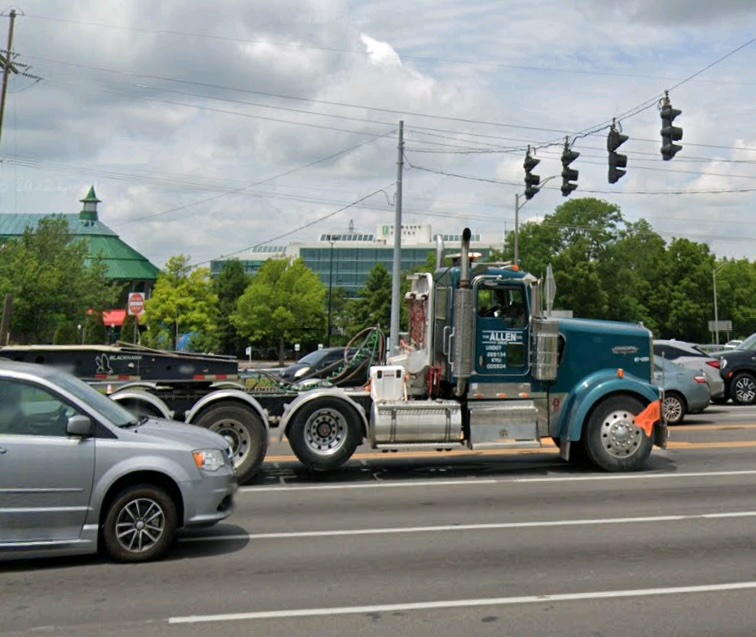
Even if you drive carefully, these areas raise the chances of being in a truck accident. All it takes is one careless moment or overloaded rig to turn a normal day into something life-changing.
Who’s Actually Responsible After a Truck Accident in Lexington?
Truck accidents are rarely simple. Unlike a typical car accident—where it’s usually just one driver up against another—these cases often involve several people or companies, all with potential responsibility. And figuring out who caused the accident itself is what determines who pays for your medical bills, lost time, and other damages. Usually, this falls on:
- The driver or trucking company – If the driver was speeding, distracted, or running on too little sleep, they may be at fault. But if the company pushed unsafe schedules or skipped safety checks, they could be responsible too.
- The truck or parts manufacturer – Defects in brakes, tires, or other components can point to the people who built or sold faulty equipment.
- Maintenance crews – A missed repair or rushed inspection can lead to failure on the road. Along the same lines, if a mechanic overlooked something important, their shop might be liable.
- Cargo crews – When cargo or freight is packed unevenly or not secured properly, it can shift during the drive and cause the truck to lose control.
- City or state government – Poor road design, lack of signs, or big potholes can all contribute to an accident. If road conditions played a role, the government agency in charge may bear some of the blame.
- Other drivers – Sometimes, a car cuts off a truck or causes a sudden stop. In those cases, the truck may not be the one at fault at all.
As you can probably tell, liability in truck accidents is rarely cut and dry. Our job is to untangle that web, figure out who dropped the ball, and make sure you aren’t the one left paying for it. But it’s important to look at how these accidents happen–and why.
What Kind of Truck Accidents Could Happen To Me in Lexington?
Truck accidents aren’t one-size-fits-all. And the kind of accident you’re in often depends on the road, the weather, and the way that truck was being driven—or overloaded, or maintained. Here are a few types we see often here in Lexington:
- Rear-end collisions – Trucks don’t stop like cars do. A semi coming too fast down I-75 or tailgating on New Circle can easily slam into the back of a smaller vehicle. These collisions often result in neck, spine, or brain injuries — especially at highway speeds.
- Jackknife accidents – If a truck loses traction or brakes too suddenly, the trailer can swing out and fold like a pocketknife. That’s bad enough on its own, but in high-traffic areas like the I-64/75 interchange, it can also trigger chain-reaction accidents behind it.
- Underrides – These are among the worst. If a smaller car goes under the back or side of a trailer, the damage is often fatal. Poor visibility, low lighting, or missing underride guards can all contribute—and these accidents are more likely at higher speeds outside city limits.
- Rollovers – We’ve seen trucks tip over on ramps, curves, and intersections—often because of shifting cargo, mechanical issues, or trying to take a turn too quickly. Once a truck goes over, everything nearby is at risk.
The truth is, no two truck accidents play out the same. And when a big truck is involved, even a “minor” collision can turn serious. If it’s happened to you or someone close to you, we’re here to help you sort through what happened and figure out the next steps–which means filing a claim.
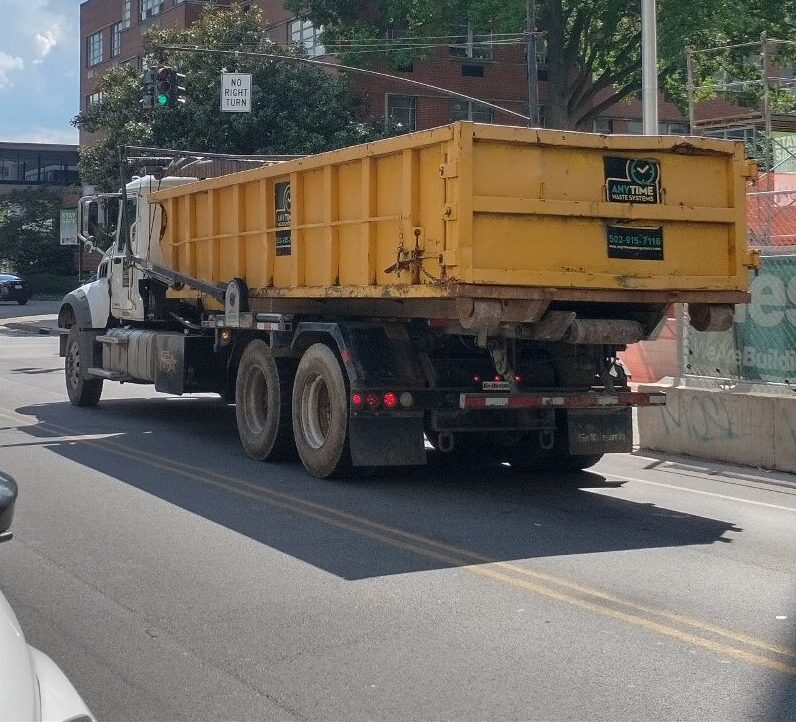
What Does the Claims Process Look Like After a Truck Accident?
If you’ve been through a serious truck accident, you already know how tough the aftermath can be. There’s the shock, the pain, the chaos—and then there’s the legal side of things, which can feel like a whole other mess.
There is good news, though. The basic process of filing a claim after a truck accident isn’t that different from any other car accident. The challenge is in the details—how many parties are involved, how serious the injuries are, and how stubborn the insurance companies might be. Here’s what it usually looks like:
- Filing an insurance claim – It starts with an insurance claim against the driver, company, or whoever else was at fault. Basically, we’ll help you file a claim with the driver’s auto insurance or the company’s liability insurance carrier and go from there with negotiations.
- Filing a lawsuit – If the insurance company refuses to offer a fair settlement, you can move forward with a personal injury lawsuit in civil court. Our team will handle all the responsibilities, and will support you through the entire court process.
Your best option depends on the particulars of your accident, but generally, you can file both an insurance claim and lawsuit if that’s what it takes. The entire point is to recover “damages”, which is just the legal term for your losses from the accident. Usually, this includes:
- Medical bills, both current and future
- Lost wages and missed work
- Reduced ability to earn, if injuries affect your career long-term
- Vehicle repairs or the cost to replace your car
- Pain and suffering
- Mental or emotional trauma
- Scarring or permanent injury
- Loss of enjoyment of daily life
- Funeral and burial costs (in fatal accidents)
Keep in mind: Kentucky gives you just one year to file most personal injury claims. That clock starts ticking from the date of the accident—and once it runs out, so do your options. That’s why it’s smart to get help early and start building your case while the evidence is still fresh. But this brings up a key question: what evidence will I need?
What Evidence Will I Need For My Truck Accident Claim?
After a serious truck accident, it’s natural to think the damage speaks for itself. But if you’re planning to file a claim, you’ll need real, detailed evidence to show what happened, who caused it, and how it’s affected your life. Here’s the kind of information that can make or break your claim—and what to do if you’re able to gather it right after:
- Call 911 and get an official report – Always start by calling emergency services. First responders will get help on the scene and document key details. In Lexington, that could be the Lexington Police Department (LPD) or even Kentucky State Police (KSP), depending on where the accident happened—like near I-75 or along New Circle Road. Their report often becomes the first official piece of evidence in your insurance claim–though you can’t use it as direct evidence in a lawsuit because it’s essentially hearsay.
- Pictures and videos – If you’re physically able, use your phone to capture the scene. Try to get shots of the vehicles, road layout, skid marks, damage, and any identifying markings on the truck (like company logos or license numbers). Don’t forget things like weather, lighting, or road conditions—they all help tell the story.
- Personal and insurance information – Make sure you get the truck driver’s name, insurance, and employer information. If there are witnesses nearby—another driver, a pedestrian, even a store employee who saw it from the sidewalk—ask for their contact info too. Independent witness statements can be powerful later on.
- Statements – It’s easy to talk too much after a traumatic accident. Stick to basic facts when speaking with police or insurance reps. Don’t try to “shrug it off,” don’t guess, and don’t say you’re fine if you’re not. Insurance companies will often use your words to downplay your injuries or shift the blame.
- Documents and receipts – After the accident, save everything—medical records, hospital bills, urgent care receipts, repair estimates, rental car paperwork, even pain journals or text messages about missed work. Every piece helps show how the accident disrupted your life.
- Trucking company data – While you can ask, our team can step in and help track down harder to get evidence like dashcam footage, black box data, trucking logs, and anything else that helps support your case from the company itself.
Obviously, your main focus after your accident should be your health and safety. That means, in some situations, it might not be possible to get this information and evidence. That’s when you can lean on our team for further support and guidance.
Frequently Asked Questions
Do I file my claim against the truck driver or the company?
It really depends on whether the truck driver is an independent contractor (owner-operator) or works for a company. What matters is whether they caused the crash. If the driver was careless—or if their employer pushed unsafe practices—either (or both) can be held responsible under Kentucky law.
How do I know what caused the truck accident?
You may not have answers right away, especially if you were seriously hurt or taken from the scene. That’s where we come in. Our Lexington truck accident team looks at everything—driver logs, black box data, maintenance records, cargo reports—to piece together exactly what went wrong and who’s accountable.
Can my family bring a claim if the truck accident was fatal?
Yes. If your loved one was killed in a truck accident, Kentucky law allows surviving family members (through a personal representative) to file a wrongful death claim. This kind of case can help cover funeral costs, lost financial support, and the deep emotional toll of losing someone too soon.
Talk to Our Lexington Truck Accident Lawyers
Facing a truck accident and its fallout in Lexington can be totally life-changing. Whether your accident happens on I-75 or Downtown, it’s likely to leave you with major injuries, damage to your car, and other challenges. That’s when our Lexington truck accident lawyers at Kaufman & Stigger, PLLC will step in and help you. Get started today with a free consultation.
